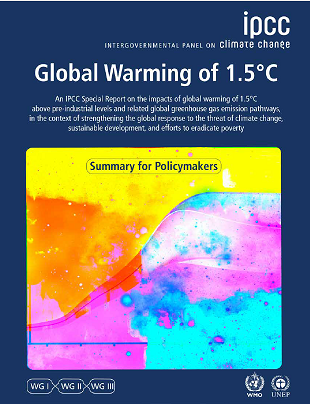
Why 1.5°C?
There are several reasons why determined efforts are being made to limit global warming to 1.5°C:
- The Paris Agreement specifies "well below 2°C" and pursuing "efforts to limit the temperature increase to 1.5°C".
- It is a question of justice vesus injustice.
- Outcomes steadily worsen as tempertures rise.
- As temperatures rise, there is an increasing risk of tipping points.
The Paris Agreement
The Paris Agreement specifies "well below 2°C" and pursuing "efforts to limit the temperature increase to 1.5°C". See the full text in document 113.People who are most affected by climate change are asking that this commitment is honoured.
Justice vesus injustice
It is the people who are the least responsible for climate change who are the most affected, so the harms from burning fossil fuels are a question of injustice. With the harms being so enormous, it is a question of gross injustice.Steadily worsening outcomes
As the temperature rises, the outcomes of climate change steadily worsen (see document 144):- the numbers of climate deaths: one death for every 4,000 tonnes CO2 - that is one climate death for the lifetime emissions of every five UK citizens at current average emission rates
- the numbers of refugees
- the loss of habitats such as coral reefs:
- the majority (70-90%) of warm water (tropical) coral reefs that exist today will disappear if global warming reaches 1.5°C ([1], p179)
- 99% of corals will be lost with warming of 2°C ([1], p230).
Tipping points
As temperatures rise, there is also an increasing risk of tipping points - sudden non-linear worsenings in the situation.Summary document
 The SR15 report [2][3][4] was published by the IPCC in 2018. It set out the case for 1.5° rather than 2.0°C as the target for limiting global warming.
The SR15 report [2][3][4] was published by the IPCC in 2018. It set out the case for 1.5° rather than 2.0°C as the target for limiting global warming.Some key points from this are:
- "limiting global warming to 1.5°C would require rapid and far-reaching transitions in energy, land, urban and infrastructure (including transport and buildings), and industrial systems" [3]
- "These systems transitions are unprecedented in terms of scale, but not necessarily in terms of speed, and imply deep emissions reductions in all sectors" [3]
- "[Global] emissions of CO2 would need to fall by about 45 percent from 2010 levels by 2030, reaching 'net zero' around 2050." [4]
- "The next few years are probably the most important in our history".
References
| [1] | IPCC SR15 report: Chapter 3: Impacts of 1.5°C of Global Warming on Natural and Human Systems (2019) https://www.ipcc.ch/site/assets/uploads/sites/2/2019/02/SR15_Chapter3_Low_Res.pdf |
| [2] | IPCC (Oct 2018) SR15 report press release https://www.ipcc.ch/site/assets/uploads/2018/11/pr_181008_P48_spm_en.pdf |
| [3] | IPCC (Oct 2018) SR15 report headline statements https://www.ipcc.ch/site/assets/uploads/sites/2/2019/06/SR15_Headline-statements.pdf |
| [4] | IPCC (Oct 2018) SR15 Summary for policymakers https://www.ipcc.ch/site/assets/uploads/sites/2/2018/07/SR15_SPM_version_stand_alone_LR.pdf |
First published: 9 Feb 2023
Last updated: 30 Sep 2023

 ✖
✖